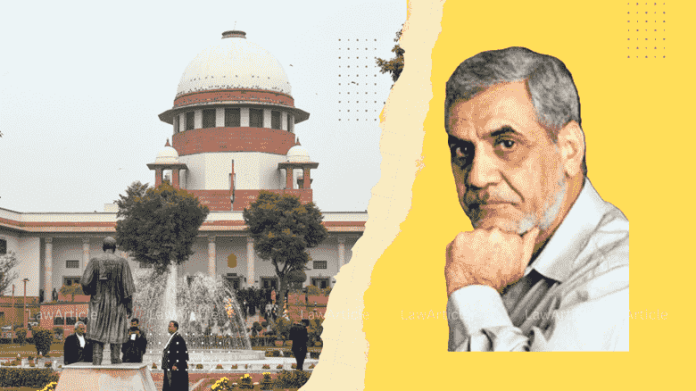MC Mehta Vs Union of India
EQUIVALENT CITATION: MC Mehta v. Union of India case is (1987)1 SCC 395.
BENCH: Justice E.S. Venkataramiah, Justice Ranganath Misra, and Justice M.N.
Venkatachaliah.
PETITIONER: The petitioner was environment activist Shri M.C. Mehta.
RESPONDENT: The respondent were the Union of India, representing the central government, along with various state governments and other concerned authorities responsible for environmental protection and management.
DATE OF JUDGEMENT: February 22, 1987.
BRIEF
The MC Mehta vs Union of India case, a landmark environmental litigation in India, was filed in 1985 regarding pollution in the Ganga River. The Supreme Court of India issued several directives to control pollution, including the closure of polluting industries and the implementation of wastewater treatment plants. This case led to the establishment of the National Ganga River Basin Authority and highlighted the judiciary’s role in environmental protection.
FACTS
One of the pivotal facts in the MC Mehta vs Union of India case of 1986 was the extensive pollution of the Ganga River due to industrial and sewage waste disposal. This pollution had severe environmental and public health implications, prompting the petitioner, MC Mehta, to seek judicial intervention to address the issue
ISSUES
The MC Mehta vs Union of India case of 1986 primarily revolved around issues related to
environmental degradation and pollution of the Ganga River. Some of the key issues addressed in the case included:
1. Pollution control measures: The case examined the inadequacy of existing pollution control measures and sought effective solutions to curb pollution in the Ganga River.
2. Industrial pollution: It addressed the role of industries in polluting the river through the discharge of untreated effluents and sought measures to regulate industrial activities along the riverbanks
3. Sewage disposal: The case highlighted the problem of untreated sewage being discharged into the Ganga River and the need for proper sewage treatment infrastructure.
4. Government responsibility: It questioned the role of the government, both central and state, in protecting and preserving the environment, particularly the Ganga River, and sought accountability for the failure to address pollution effectively. Overall, the case raised broader issues concerning environmental conservation, public health, and the
responsibility of authorities in ensuring sustainable development.
JUDGEMENT
In the MC Mehta vs Union of India case judgment delivered on February 22, 1987, the Supreme Court of India issued a series of landmark directives to address the pollution of the Ganga River. The court ordered the closure of industries violating pollution norms, mandated the installation of pollution control equipment in industries, and directed the implementation of wastewater treatment plants to treat industrial and sewage effluents before discharge into the river.
Additionally, the judgment emphasized the responsibility of both the central and state governments to take proactive measures to prevent further pollution and ensure the restoration of the Ganga River’s ecological health. This judgment laid the foundation for subsequent environmental litigation in India and highlighted the judiciary’s role in protecting the environment and upholding environmental rights.
ANALYSIS
The MC Mehta v. Union of India case of 1986 represents a significant milestone in Indian
environmental jurisprudence and activism. Here’s an analysis of its key aspects:
1. Judicial Activism: The case exemplifies the proactive role of the judiciary in addressing
environmental issues. The Supreme Court’s intervention led to groundbreaking directives to control pollution in the Ganga River, demonstrating the judiciary’s commitment to environmental protection.
2. Impact on Environmental Policy: The judgment prompted the formulation and implementation of various environmental laws and policies in India, including the Water (Prevention and Control of Pollution) Act, 1974, and the Environment (Protection) Act, 1986. It set a precedent for stringent enforcement of environmental regulations and inspired similar litigation for other environmental concerns across the country.
3. Public Interest Litigation (PIL): The MC Mehta case established the efficacy of Public Interest Litigation as a tool for addressing environmental issues. It empowered citizens and activists to approach the courts on behalf of the public interest, leading to increased accountability of governments and industries regarding environmental protection
4. Role of Stakeholders: The case highlighted the importance of stakeholder engagement in
environmental decision-making. It brought attention to the rights of affected communities,
environmental activists, and non-governmental organizations (NGOs) in advocating for environmental justice and sustainable development.
5. Long-Term Impact: The judgment’s directives, including the closure of polluting industries and the establishment of wastewater treatment plants, had a tangible impact on the Ganga River’s water quality and ecosystem health. However, challenges such as enforcement issues and continued pollution persist, underscoring the need for sustained efforts in environmental governance and management.
Overall, the MC Mehta v. Union of India case remains a landmark example of judicial activism in environmental matters and underscores the judiciary’s crucial role in safeguarding environmental rights and promoting sustainable development.
Also Read:
Shadwell vs Shadwell
How To Send A Legal Notice In India



